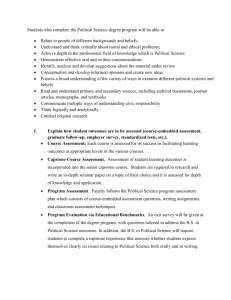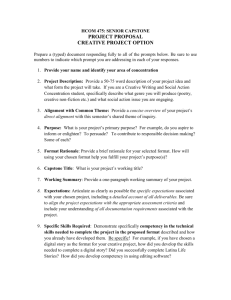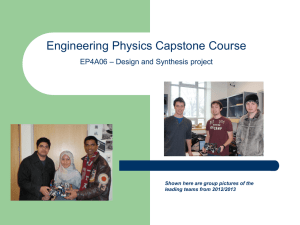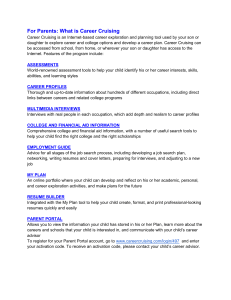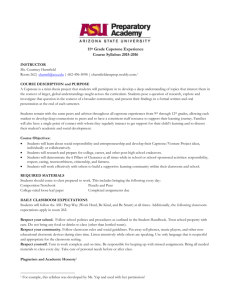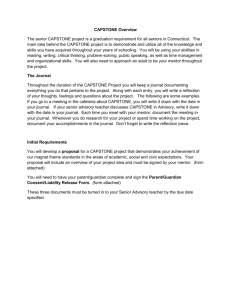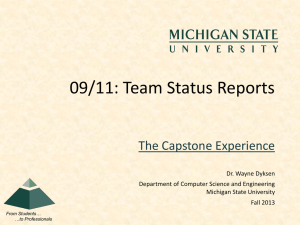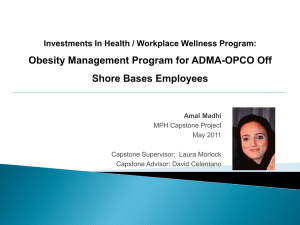Syllabus - Connecticut Regional Vocational
advertisement
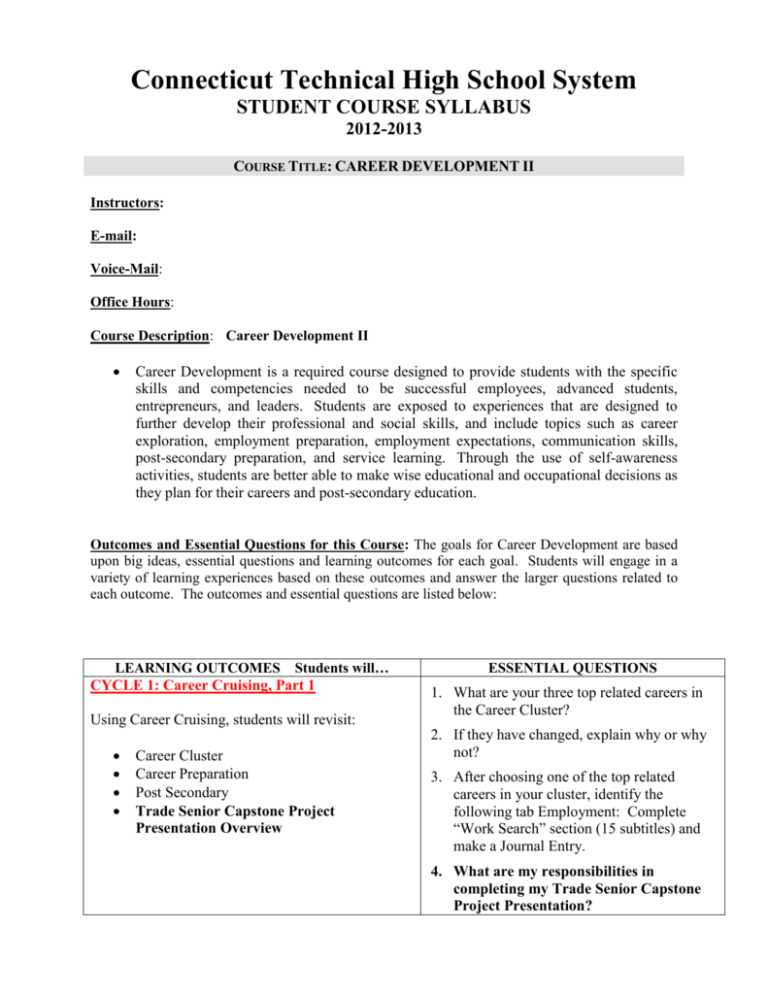
Connecticut Technical High School System STUDENT COURSE SYLLABUS 2012-2013 COURSE TITLE: CAREER DEVELOPMENT II Instructors: E-mail: Voice-Mail: Office Hours: Course Description: Career Development II Career Development is a required course designed to provide students with the specific skills and competencies needed to be successful employees, advanced students, entrepreneurs, and leaders. Students are exposed to experiences that are designed to further develop their professional and social skills, and include topics such as career exploration, employment preparation, employment expectations, communication skills, post-secondary preparation, and service learning. Through the use of self-awareness activities, students are better able to make wise educational and occupational decisions as they plan for their careers and post-secondary education. Outcomes and Essential Questions for this Course: The goals for Career Development are based upon big ideas, essential questions and learning outcomes for each goal. Students will engage in a variety of learning experiences based on these outcomes and answer the larger questions related to each outcome. The outcomes and essential questions are listed below: LEARNING OUTCOMES Students will… CYCLE 1: Career Cruising, Part 1 Using Career Cruising, students will revisit: Career Cluster Career Preparation Post Secondary Trade Senior Capstone Project Presentation Overview ESSENTIAL QUESTIONS 1. What are your three top related careers in the Career Cluster? 2. If they have changed, explain why or why not? 3. After choosing one of the top related careers in your cluster, identify the following tab Employment: Complete “Work Search” section (15 subtitles) and make a Journal Entry. 4. What are my responsibilities in completing my Trade Senior Capstone Project Presentation? CYCLE 2: Financial Fitness – Part 1 1. Name six types of loans to pay for college. Using Financial Fitness Website, (http://studentmoneyskills.bankofamerica.com/start/) students will complete the following areas: Paying for College Borrowing Money for College 2. What will be the total cost of your college education? 3. What is FAFSA? 4. What is FAFSA used for? 5. Once the FAFSA is evaluated, what information will it provide for you? CYCLE 3: Financial Fitness - Part 2 Using Financial Fitness Website (http://studentmoneyskills.bankofamerica.com/start/), students will complete the following areas: Budgeting Smart Credit Topic identification for Trade Senior Capstone Project Presentation 1. Why is it important to establish and maintain your finances? 2. What are the four steps when setting up your budget? 3. What is discretionary spending? 4. What are the advantages and disadvantages of using a credit card? 5. If you mismanage the use of your credit card, how will you be penalized? 6. What is the topic(s) of my Trade Capstone Senior Project Presentation? CYCLE 4: Financial Fitness - Part 3 1. What is Identity Theft? Using Financial Fitness Website (http://studentmoneyskills.bankofamerica.com/start/), students will complete the following areas: Identity Theft Banking 2. How does someone steal your identity? 3. What are the four steps you should follow if you are a victim of identity theft or fraud? 4. How would you select a bank? 5. What services would you need in order to manage your finances? CYCLE 5: Career Dev. - Part 1 1. What are the factors in choosing housing? Using the Working Textbook, students will review the topic “Independent Living” in the following areas: 2. What should you consider before deciding to rent an apartment? Housing Needs Apartment Hunting Progress check for Trade Senior Capstone Project Presentation 3. What steps should you take to find and rent an apartment? 4. What is the purpose of a security deposit? 5. What information have I gathered for my Trade Senior Capstone Project Presentation? CYCLE 6: Career Dev., Part 2 Using the Working Textbook, students will review the topic “Independent Living” in the following areas: Rental Agreement Apartment Living Rights & Responsibilities of the Tenants & Landlords CYCLE 7: Career Cruising, Part 2 Using Career Cruising, students will revisit: Work Search Interviewing Working on Trade Senior Capstone Project Presentation CYCLE 8: Career Cruising, Part 3 Using Career Cruising, students will revisit: . Resumes Letter Writing Finalize Trade Senior Capstone Project Presentation 1. What are some keys to living successfully with a roommate? 2. What are some things that roommates should discuss before signing a rental agreement? 3. What is the tenant’s responsibility? 4. What is the landlord’s responsibility? 5. Define an eviction and the landlord’s role in evicting a tenant? 1. What is the occupational outlook for your chosen occupation? 2. What are some of the best resources for researching potential employers in your chosen occupation? 3. How would you prepare to attend a Job Fair? 4. What are three areas you need to improve for a job interview and what are your strengths? 5. List five ways you would prepare for a job interview. 6. What progress have I made towards completing my Trade Senior Capstone Project Presentation? 1. How could you improve your resume? 2. List additional skills, experiences and accomplishments. 3. What does your resume say about you? 4. Why is it important to write a cover, thank you and follow up letter? 5. What is the process to writing to a potential employer? 6. What progress have I made towards completing my Trade Senior Capstone Project Presentation? CYCLE 9: Career Cruising, Part 4 Using Career Cruising, students will upload their finalized Trade Senior Capstone Project Presentation in “My Files” and present. CYCLE 10: Career Cruising, Part 5 Using Career Cruising, students will upload their finalized Trade Senior Capstone Project Presentation in “My Files” and present. Utilizing the Trade Technology Skills Checklist, students will create and present a PowerPoint presentation demonstrating the skills and knowledge acquired within their trade. (i.e. NIMS, NOCTI, SCAP, etc.) Continuation of Cycle 9: Utilizing the Trade Technology Skills Checklist, students will create and present a PowerPoint presentation demonstrating the skills and knowledge acquired within their trade. (i.e. NIMS, NOCTI, SCAP, etc.)
